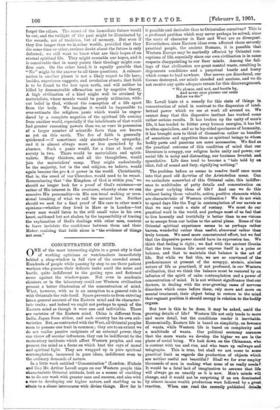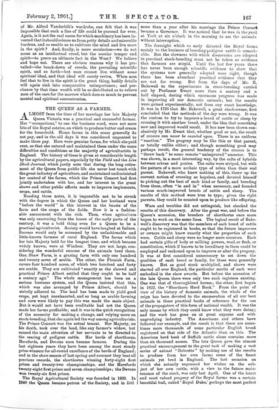CONCENTRATION OF MIND.
ONE of the most interesting sights in a great city is that of working opticians or watchmakers immediately behind a shop-window in full view of the crowded street. Hundreds of people while passing by stop to see these patient workers who pursue their delicate tasks amid the noise and bustle, quite indifferent to the gazing eyes and flattened noses against the window-pane. Not even in academic cloisters or in the laboratory could our Western civilisation present a better illustration of the concentration of mind. What, however, with us is an exception to a general rule is with Orientals the rule itself. Space prevents us from entering into a general account of the Eastern mind and its character- istic traits ; and indeed we ought not perhaps to speak of the Eastern mind as though it were one and indivisible. There are varieties of the Eastern mind. China is different from India, Japan from either, and each country has its own sub- varieties. But, as contrasted with the West, all Oriental peoples seem to possess one trait in common ; they are to an extent we do not realise passive recipients of an external power, they can throw off secular influences, they can be indifferent to the momentary incidents which affect Western peoples, and can present the mind as a focus on which beat the rays of moral and spiritual light. They are wrapped up in pure spiritual contemplation, immersed in pure ideas, indifferent even to the ordinary demands of nature.
In a little work entitled "Concentration" (London: Nichols and Co.) Mr. Arthur Lovell urges on our Western people this characteristic Oriental attitude, both as a means of enabling us to do our work with greater ease and success, and also with a view to developing our higher nature, and enabling us to attain to a closer intercourse with divine things. How far is
it possible and desirable thus to Orientalise ourselves P This is a profound problem which may never perhaps be solved, since the roots of character in East and West are so divergent. Nevertheless, since Eastern ideas even affected those severely practical people, the ancient Romans, it is possible that Western Europe may be markedly affected by Oriental con- ceptions of life, especially since our own civilisation is in some respects disappointing to our finer minds. Among the fail- ings of that civilisation are great mental waste, resulting in degenerate conditions and a perpetual bustle and hurry which seems to lead nowhere. Our nerves are disordered, our tissues destroyed, our minds clouded and anxious, and we do not receive any quite adequate return for this disarrangement.
" We glance, and nod, and bustle by, And never once possess our souls
Before we die."
Mr. Lovell hints at a remedy for this state of things in concentration of mind in contrast to the dispersion of intel- lectual power which we see at work all around us. We cannot deny that this dispersive instinct has worked some rather serious results. It has broken up the unity of man's life, it has tended to fritter away human energies, it has led to ultra-specialism, and so to lop-sided specimens of humanity, it has brought men to think of themselves rather as bundles of sensations and appetites than as spiritual beings to whom bodily parts and passions are mere accessories. We find as the practical outcome of this condition of mind that our literature is scrappy, our religion lacks unity and power, our social life is noisy and distracting, our business feverish and speculative. Life does tend to become a " tale told by an idiot, full of sound and fury, signifying nothing."
The problem before us seems to resolve itself once more into that good old doctrine of the Aristotelian mean. Can we assimilate somewhat of this Oriental calm, this indiffer- ence to multitudes of petty details and concentration on the great undying ideas of life ? And can we do this without losing those valuable, active, positive elements which are characteristic of Western civilisation ? We do not wish to spend days like the Yogi in contemplation of our navels so that we may reach a state of ecstasy. We must do our practical work in the world, and perhaps most of us feel that to live honestly and truthfully is better than to see visions or to escape from our bodies to the astral plane. Some of the Oriental spiritual experience seems to us perhaps rather barren, wonderful rather than useful, abnormal rather than truly human. We need more concentrated effort, but we feel that the dispersive power should have its expression too. We think that feeling is right ; we find with the ancient Greeks that the true human life must express itself in a poise or balance, and that to maintain that balance is the art of life. But while we feel this, we are so convinced of the predominance at present of the scrappy, atomic, aimless nature of life as practised, if not professed, in our Western civilisation, that we think the balance must be restored by an infusion of the spirit of calm contemplation and a power of concentration of mind. It is not without significance that our doctors, in dealing with the ever-growing cases of nervous disorders which come before them, rely more and more on mental treatment, their object being to restore to the mind that regnant position it should occupy in relation to the bodily organs.
But how is this to be done, it may be asked, amid the
growing details of life? Western life not only tends to more and more detail, but the conditions render it inevitable. Economically, Eastern life is based on simplicity, on fewness of wants, while Western life is based on complexity and a multitude of wants. Our political economy assumes that the more wants we develop the higher we are in the plane of social being. We look down on the Chinaman, who is content with tea and rice, and who tears up railways and telegraphs. This is true, but shall we not come to some practical limit as regards the production of objects which are neither useful nor beautiful? Shall we for ever employ thousands of men in making what none of us really needs P It would be a fatal lack of imagination to assume that life will always go on exactly as it is now. Men's minds will change, and it would not be surprising if an era dominated by almost insane wealth production were followed by a great reaction When one read the recently published details
-
of Mr. Alfred Vanderbilt's wardrobe, one felt that it was impossible that such a line of life could be pursued for ever. Again, is it not the real cause for which machinery has been in- vented that it should release us from petty details and miserable burdens, and so enable us to cultivate the mind and live more in the spirit ? And, finally, is mere secularism—we do not mean as an intellectual creed, but the secular temper and spirit—to prove an ultimate fact in the West? We believe and hope not. There are obvious reasons why it has pre- vailed—the break-down of creeds, the prevaili g scientific spirit, and so forth—but man cannot live without some spiritual ideal, and that ideal will surely revive. When men feel that to live in the spirit is the great thing, bodily details will again sink into comparative unimportance; and per- chance by that time wealth will be so distributed as to relieve men of the care for the morrow which does so much to prevent mental and spiritual concentration.



































 Previous page
Previous page